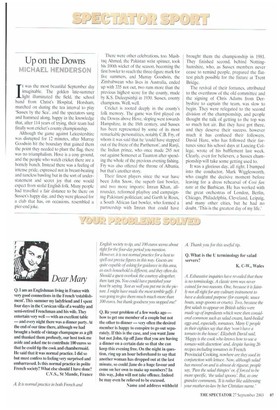Up on the Downs
/t was the most beautiful September day imaginable. The golden late-summer light illuminated the field, the school band from Christ's Hospital, Horsham, marched on during the tea interval to play 'Sussex by the Sea', and the spectators sang and hummed along, happy in the knowledge that, after 114 years of trying, their team had finally won cricket's county championship.
Although the game against Leicestershire was disrupted for 12 minutes, after Murray Goodwin hit the boundary that gained them the point they needed to plant the flag, there was no triumphalism. Hove is a cosy ground, and the people who watch cricket there are a homely bunch. Instead there was a feeling of intense pride, expressed not in breast-beating and tuneless bawling but in the sort of understatement and secret joy that one would expect from stolid English folk. Many people had travelled a fair distance to be there on Sussex's happy day, and they were pleased for a club that has, on occasions. resembled a pier-end joke. There were other celebrations, too. Mushtaq Ahmed, the Pakistan wrist spinner, took his 100th wicket of the season, becoming the first bowler to reach the three-figure mark for five summers, and Murray Goodwin, the Zimbabwean who lives in Australia, ended up with 335 not out, two runs more than the previous highest score for the county, made by K.S. Duleepsinhji in 1930. Sussex, county champions. Well, well.
Cricket is rooted deeply in the county's folk memory. The game was first played on the Downs above Hove, sloping west towards Hampshire, in the 18th century, and Sussex has been represented by some of its most remarkable personalities, notably C.B. Fry, of whom it was said that he 'could have stepped out of the frieze of the Parthenon', and Ranji, the Indian prince, who once made 285 not out against Somerset at Taunton after spending the whole of the previous evening fishing. Fry was also offered the throne of Albania, but that's another story.
Their finest players since the war have been John Snow, the superb fast bowler, and two more imports: Imran Khan, allrounder, reformed playboy and campaigning Pakistani politician; and Garth le Roux, a South African fast bowler, who formed a partnership with Imran that could have brought them the championship in 1981. They finished second. behind Nottinghamshire, who, as Sussex members never cease to remind people, prepared the flattest pitch possible for the fixture at Trent Bridge.
The revival of their fortunes, attributed to the overthrow of the old committee and the signing of Chris Adams from Derbyshire to captain the team, was slow to begin. They were relegated to the second division of the championship, and people thought the talk of getting to the top was so much hot air. But they have got there, and they deserve their success, however much it has confused their followers. David Hare, who has followed their fortunes since his school days at Lancing College, wrote of his bafflement last week. Clearly, even for believers, a Sussex championship will take some getting used to.
It was a glorious day, all right. I bumped into the conductor. Mark Wigglesworth, who caught the decisive moment before leaving for a dress rehearsal of Cosi fan tutte at the Barbican. He has worked with the great orchestras of London, Berlin, Chicago, Philadelphia, Cleveland, Leipzig, and many other cities, but he had no doubt. 'This is the greatest day of my life.'


























































































 Previous page
Previous page